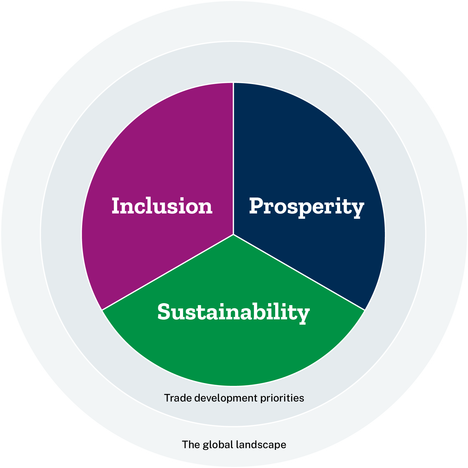
Who we are
Building trade-led growth for a more equitable world.
Our support for micro, small and medium-sized businesses’ ability to compete can lift individuals, communities and countries out of poverty and create a more equitable world.
Inclusion:
We emphasize economic empowerment and fairly paid job opportunities for women, youth, refugees and migrants and other vulnerable populations.
Sustainability:
We help economies and micro, small and medium sized- businesses go green and transition towards sustainable development through the circular economy.
Prosperity:
We leverage technology to narrow the digital divide, use Aid for Trade to support developing countries and build their capacity to benefit from trade.
We are a multilateral agency with a joint mandate with the World Trade Organization and the United Nations through the UN Trade and Development.
We provide country-and client-specific tailored support through unique advisory services, capacity building, training and mentoring, free tools and business data, and trade-specific publications.
We improve the availability and use of trade intelligence; strengthen trade support institutions; enhance policies for the benefit of exporting enterprises; build the export capacity of enterprises to respond to market opportunities; and mainstream inclusiveness.
We leverage the current digital momentum, the exponential use of e-commerce platforms and artificial intelligence by incorporating digital elements in all of our projects.
We connect micro, small and medium-sized enterprises to global and regional value chains, a major contributor to economic growth and poverty reduction.
ITC is the joint agency of the United Nations and the World Trade Organization, fully dedicated to supporting small businesses of developing countries to trade. Originally created by the General Agreement on Tariffs and Trade (GATT) in 1964, ITC has operated since 1968 under the joint aegis of GATT/WTO and the United Nations, the latter acting through the UN Trade and Development (UNCTAD). ITC is the focal point in the United Nations system for technical cooperation with developing countries and economies in transition, on trade promotion and export development.
While UNCTAD and WTO work principally with governments, ITC focuses on equipping micro, small and medium-sized enterprises (MSMEs) to become more competitive in global markets. In this context, ITC translates the business implications of multilateral trade agreements for businesses, so they can understand, shape and benefit from trade rules. ITC thereby helps to build vibrant, sustainable export sectors that provide entrepreneurial opportunities, particularly for women, youth and vulnerable communities.
As a subsidiary agency of UNCTAD and the WTO, ITC is subject to the governing bodies of both. ITC is also subject to the internal oversight procedures of the United Nations. The WTO and UNCTAD are represented in the Joint Advisory Group, which governs ITC’s work, and have a number of joint technical assistance activities with ITC, which include:
The Global Trade Helpdesk (GTH) – a joint initiative of ITC, UNCTAD and the WTO – streamlines market research for companies, with a focus on supporting MSMEs. This online portal is a one-stop shop of trade information, covering trade flows, market access requirements, export potential, customs, sustainability standards, technical barriers to trade, rules of origin and more. The initiative is expanding, including through technological upgrades of the platform and multilingual options, as requested by the G20, to enhance MSME access. ITC and UNCTAD align non-tariff measures data with the WTO through regular meetings.
Since the 2017 Buenos Aires Declaration on Women and Trade and the establishment of the WTO Informal Working Group on Trade and Gender in 2020, ITC has actively contributed to both the International Gender Champions' Trade Impact Group and the Informal Working Group.
In particular, ITC developed a gender-lens analytical framework for WTO-related work and agreements. This framework has been applied to various WTO initiatives, including e-commerce, government procurement, trade facilitation and investment facilitation for development.
Within ITC, we are committed to pursuing gender equality, women’s empowerment, geographic diversity, disability inclusion and zero discrimination. Our aim is a work environment that embraces diversity, eradicates bias and has zero tolerance for any form of discrimination and harassment. We use UN-led benchmarking and monitoring frameworks to keep on track of these goals.
ITC and UNCTAD collaborate closely on sustainable trade initiatives. They are involved in the Global BioTrade Facilitation Programme, including the BioTrade self-assessment tool on ITC's Sustainability Map. ITC has also contributed to the programme's strategy. Additionally, both organizations participate in the United Nations Forum on Sustainability Standards, and ITC is a member of UNCTAD's Voluntary Sustainability Standards Academic Advisory Council.
At the United Nations Climate Change Conference (COP), the WTO, ITC and UNCTAD collaborate through joint events. The aim is to foster dialogue with the global community, to explore how trade can drive sustainable development and ensure a just and inclusive transition. ITC is also committed to enhancing the climate competitiveness of developing nations by facilitating their engagement in WTO's Trade and Environmental Sustainability Structured Discussions.
ITC, UNCTAD and the WTO collaborate on various studies, including an impact study on the effects of least developed countries’ (LDCs) graduation on the textiles and clothing sector in Asian LDCs, namely Bangladesh, Cambodia, Laos, Myanmar and Nepal. The three agencies also co-organize conferences and events to promote cooperation, such as the Cotton Partners Conference. During these events, discussions on grant-matching funds for cotton value chain development projects in African countries are held. The three organizations, along with other partners, have signed a Call for Action on Cotton, aimed at addressing challenges and enhancing competitiveness, yields and sustainable production in cotton-producing LDCs.
ITC has been collaborating with the WTO on trade facilitation, in particular through the WTO Trade Facilitation Agreement Facility in partnership with Annex D+ organizations. Collaboration includes the sharing of information and experiences on ongoing trade facilitation-related technical assistance projects and potential new technical assistance requested by WTO Members to support implementation of the Trade Facilitation Agreement.
ITC and the WTO work closely together on a project on investment facilitation for development. This project focuses on capacity building for developing countries to actively engage in WTO negotiations. Additionally, the WTO and ITC have co-produced publications and policy briefs related to investment facilitation for development. This collaboration ensures that practical experiences and analytical insights continue to inform negotiators and promote public discussions on investment matters within the WTO.
ITC is a reliable partner of the WTO, providing in-country trade assistance and supporting ongoing WTO accession for various countries, including Iraq, Turkmenistan and Uzbekistan. They have jointly launched the Inter-Agency Coordination Group on Accession Technical Assistance to facilitate information exchange. ITC actively participates in donor coordination meetings for countries engaged in the accession process, such as Uzbekistan, Timor-Leste and Turkmenistan.
ITC, collaborating on an Enhanced Integrated Framework project, connects women coffee growers to global coffee markets using digital supply chain networks and blockchain technology. Since the project's launch, numerous women entrepreneurs have gained access to new markets, and a significant number of women coffee growers have adopted digital traceability solutions based on blockchain technology.
UNCTAD and ITC have collaborated in Central Asia through the Ready4Trade project, which involved a comprehensive review of e-commerce legislation in Kazakhstan and provided training to policymakers on WTO e-commerce discussions. In Tunisia, the two organizations worked together to develop activities aligned with the eTrade Readiness Assessment's action matrix, aimed at potential donor financing.
ITC and UNCTAD collaborate jointly to highlight the specific needs of MSMEs on digitalization and its importance for their access to markets during the annual UNCTAD eWeek gatherings.
ITC and UNCTAD collaborate to implement Trade Facilitation Portals (TFP) in alignment with Article 1.2 of the WTO Trade Facilitation Agreement. These efforts have resulted in the establishment, launch and enhancement of over 17 TFPs across Africa, the Middle East, Central Asia, South Asia and South-East Asia. Notably, new TFPs have been introduced in Turkmenistan, Uzbekistan, Kazakhstan and Kyrgyzstan.






